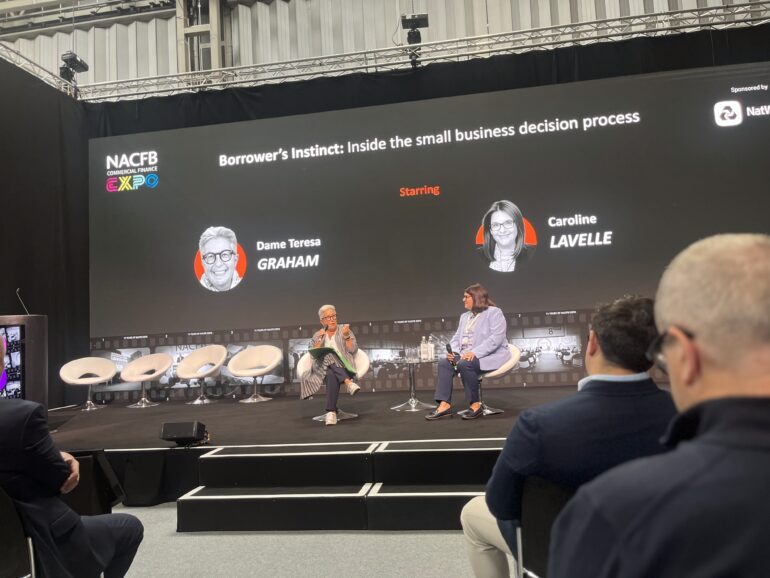Speaking at the NACFB Commercial Finance Expo today (11th June 2025), Dame Teresa Graham (pictured, left), chair of the Administrative Burdens Advisory Board of HMRC, called on brokers to extend their role and view themselves as “a blend of mentor and broker.”
In conversation with Caroline Lavelle (pictured, right), chief commercial officer at the FSB, Graham called for brokers to “stop offering products and start offering solutions” and “get the trust of business owners by giving of [their] time.”
Lavelle and Graham discussed small to medium enterprises’ (SME) reluctance around tapping into funding resources for growth, as well as simply being unaware of the options available to them.
By taking on more of a ‘mentorship’ role, Graham explained that SMEs – and as a result the economy – would benefit from the fact that brokers “are the people aware of all the options available out there, and it’s often a blend of those options they need.”
Lavelle said that to do this, brokers must remember that “it’s relationships that matter,” and work to help SME business leaders move past fear of “failure and rejection.”
Lavelle also pointed out that those SMEs taking out loans with personal guarantees tended to run their business with more caution as a result, but “cautious isn’t the word we want to associate with entrepreneurship.”
She called for “more proportional regulation” around personal guarantees in particular, as well as for brokers to do what they can to demystify this area for SME borrowers.
The pair discussed that SMEs currently tend to borrow more for cashflow management than growth, due to late payment activity, interest rates for small business products running higher than the market norm, and dissatisfaction with the finance options available.
Lavelle noted that overdrafts continued to be the most popular form of financial support, but that this is not a growth driver.
As a result, Graham warned, growth has “materially downshifted, with knock-on societal consequences.”
She added that this was affecting those “innovative businesses” that fuel research and development, which have found themselves running out of money, in part due to the mechanisms of Government funding not working in their favour.
To this end, she suggested that Government should be “more discerning” with its annual contracts, providing them only to those businesses supporting others – particularly SMEs – throughout their supply chain.
When it comes to financing, Lavelle said SMEs are looking for “tailored solutions,” not simply taking into account their business profile, but also their individual characteristics, including aspects such as ethnicity, disability and gender.
She added that the market needs more options for financing for businesses with intangible assets, such as those in FinTech.
Overall, Lavelle explained that brokers must “really understand the business” they are advising, including understanding that the problem they are presenting might not be the underlying issue; for example, a business owner looking into redundancies might not realise they in fact have a cashflow issue that can be solved with financing.
Lavelle added: “There’s an opportunity to provide that service, be rewarded for it, and get a wider range of products out there to support entrepreneurship.”
Graham concluded: “I dare you to be remarkable in helping SMEs grow and flourish.”



